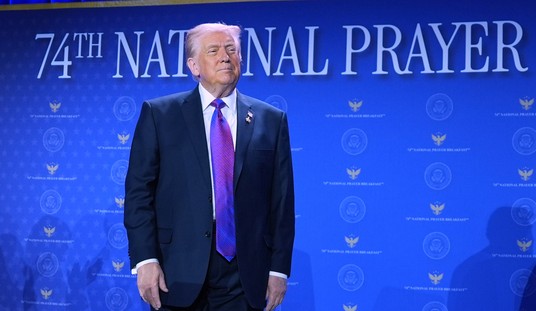Well, of course he does. Former Virginia governor Bob McDonnell, once considered a future player in national Republican politics, has enough money and lawyers to pursue appeals on his big trial loss yesterday, probably all the way to the Supreme Court if necessary. However, don’t expect even a successful appeal to rehabilitate McDonnell’s career:
Kathleen L. Carmody said she voted for Bob McDonnell and thought he was “terrific for Virginia” as governor – but as a juror in McDonnell’s corruption trial, she was compelled to convict him.
“The facts spoke for themselves,” she told The Associated Press in an interview Thursday not long after she and fellow jurors found McDonnell guilty on 11 of 13 counts. McDonnell’s wife, Maureen, was convicted of nine of 13 charges.
The case derailed the career of the onetime rising Republican star. Bob McDonnell’s attorney, Henry Asbill, said his client did not receive a fair trial and will appeal. Asbill reiterated his previous statement that prosecutors sought to criminalize routine political behavior.
“I have no idea what the jury deliberated about,” Asbill said. “There are a lot of things about the case that (you) can sit back and think about but it’s hard to tell when the die was cast.”
That was the same defense offered by the John Edwards legal team, which managed to avoid conviction at trial on multiple counts of corruption. Edwards is back as an attorney working on a malpractice case in North Carolina, and otherwise keeping a low profile. Even an acquittal (accompanied by a hung jury on most counts) didn’t resurrect Edwards as a politician, and likely won’t in the future, either. The Edwards case and the eventual dismissal by the Department of Justice did raise questions about whether the DoJ was attempting to criminalize ethics issues, which prompted a few people to ask the same questions about McDonnell.
In this case, though, the jury found the evidence of corruption “overwhelming”:
Three jurors interviewed said their decision did not turn on any one piece of evidence or the testimony of any one of the 67 witnesses they heard, but the accumulated weight of evidence mounted by prosecutors day after day.
“The evidence was overwhelming and staring us in our face,” Trujillo said.
A second juror, who spoke on the condition of anonymity, put it another way.
“It was a tough decision, but it was not a hard decision,” the woman said. “It was a tough decision to make because of the governor’s 20-plus years of service to the country and to the Commonwealth. It was hard and tough to see his family go through that. But when it came down to brass tacks, we knew the decision we had to make.” …
Trujillo also said the central theme of the defense did not hold water. Defense attorneys argued that Robert and Maureen McDonnell’s marriage was so broken they could not have conspired to use the governor’s office to push the products of businessman Jonnie R. Williams Sr. in exchange for gifts.
But Trujillo said that seemed implausible since the McDonnells were living together until a week before the trial and prosecutors produced numerous e-mails and other correspondence showing the pair had discussions about finances and regularly coordinated other plans.
The appeals will probably focus more on the encroachment of criminal prosecution into political matters than their “implausible” description of their marital woes, but that may be a tough road to hoe, too. Presumably they made that argument at trial before the judge who would be primarily responsible for determining the criminality of the actions alleged before the trial even began, and they did make that argument to the jury as well. District court judges get overturned, of course, but clearly they would have been more likely to prevail at trial on this point … and better off taking the plea deal that would have allowed McDonnell to escape any jail time.
As it is, McDonnell and his wife could get 20 years in prison for each count, although no one expects them to get that much as first-time offenders. They will return to the federal courtroom in Richmond Virginia on January 6th to hear what their punishment will be, and will likely petition for bail while appeals proceed. Without a doubt, the McDonnells had a very bad day yesterday, but was it … the worst week in Washington? Chris Cillizza says yes:
The five-week trial that preceded McDonnell’s conviction — his wife, Maureen, was convicted on eight corruption counts — depicted a personal and professional life that had spiraled badly out of control. The McDonnell marriage was supposedly in bad shape. Maureen McDonnell, according to her own lawyers, had a “crush” on Williams. Awkward. Bob McDonnell, during his time on the stand, cast his wife as insufficiently supportive of his political career and riddled with insecurities. If their marriage wasn’t over before the trial, it sure as heck is now. A parade of witnesses said the McDonnells were willfully unaware of the trouble they were getting themselves into.
What was even more stunning was the fact that McDonnell could have avoided humiliation, not to mention the near-certain prison time he and his wife now face. He was offered, and he rejected, a plea deal proposed by federal prosecutors that would have had him plead guilty to a single count and allowed his wife to escape any charges. So McDonnell proved he wasn’t just corrupt but also inept.
Bob McDonnell, for thinking that you could talk your way out of an ethical cul-de-sac, you had the worst week in Washington. Congrats, or something.
That’s a curious way to look at this. McDonnell was a governor of a state while in office, not a federal office holder. The trial took place in Richmond, Virginia — in a federal court, but over a hundred miles away from DC, on charges that had to do with McDonnell’s performance as governor and nothing to do with the nation’s capital. Shouldn’t the “worst week in Washington” belong to someone who actually works there? Say, perhaps, a President who couldn’t get his own “strategy” correct in multiple tries in a single press conference, and whose own party had begun to rebel against his disengagement?
Obama has spent the last two weeks talking tough but proposing no action at all, other than the tactical strikes necessary to keep ISIS away from Irbil and the Mosul Dam. The President has repeatedly rejected the option of putting American troops on the ground to fight ISIS, even while Kerry calls for an international coalition to stop their aggression.
The White House has offered contradictory signals on whether it wants to conduct air strikes on ISIS targets in Syria as well as the tactical strikes in Iraq, which makes Biden’s statement yesterday sound even more futile and empty than it otherwise would. We will follow ISIS to the gates of hell, but not to Syria? We will confront the evil of ISIS wherever it spreads, except every place it already resides?
Just a few hours after Obama’s comments in Talinn, CNN’s Jim Sciutto asked the Defense Secretary to explain the contradictory declarations of the Commander in Chief made just a few hours earlier. “Which it is?” Sciutto asked. “Is the mission goal to contain or destroy?” Hagel ended up citing Biden in discarding the “manageable threat” goal, saying that he hadn’t heard the exchanges with the media but had only read Obama’s written remarks. “The mission is very clearly, and we’re providing the President with these options, to degrade and destroy ISIS’ capability,” Hagel emphasized. “It’s not to contain them.”
The failure demonstrated by Obama and his administration over the last several weeks and months as the ISIS threat grew and metastasized is, at its core, a leadership crisis. Forget being the leader of the free world; this President can’t even lead his own team within one coherent message and strategy. As ABC’s State Department reporter Ali Weinberg remarked yesterday, this was the message just from one single day: “We’re going to destroy ISIS. Or manage them. Or shrink their sphere of influence. Or follow them to the gates of hell.”
With that failure to generate a united and coherent approach to ISIS among his own team, how could anyone expect the President to lead the world against this new terrorist army and the threat it poses to the region and the world?
The McDonnells had a very bad week, but not every place on the eastern seaboard is Washington, folks.
Update: Jen Rubin believes that there may well be strong grounds for appeal, and worries about the impact of criminalizing ethics issues that should be addressed by voters rather than prosecutors:
The safest advice to any politicians is that they give no tickets, invitations or introductions for anyone who has ever given them anything significant, be it a gift or campaign donations. Consider, for example, a big donor who raises millions for a president’s campaign. He then gets invited to a state dinner or gets an award for being a great American. That sort of conduct suddenly becomes high-risk.
The discretion afforded to prosecutors in the post-McDonnell era would be jaw-dropping. How many donors (big or small) have gotten state dinner invitations or access to government agencies (e.g. Solyndra) or even help navigating the bureaucracy, let alone an ambassadorship, in the past few years? Is a Republican prosecutor going to start indicting the Obamas and is a Democratic prosecutor going to go after the speaker of the House, the Senate minority leader and every Republican governor he can find? That is certainly a recipe for disaster.
While true that lawmakers themselves can set concrete rules and thereby limit prosecutorial free-roaming, the optics of passing legislation to protect themselves from corruption charges is so horrible that it may be impossible to achieve. A lot therefore rides on McDonnell’s appeal — for him, the entire political class and thousands of donors.








Join the conversation as a VIP Member